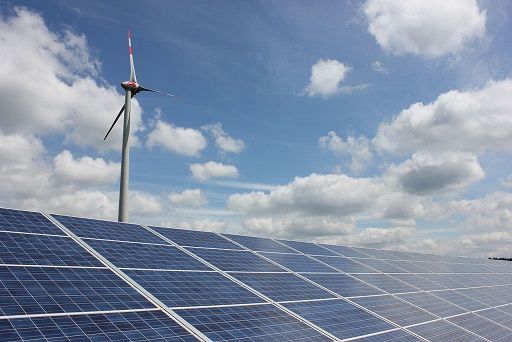Decarbonisation – the time is now
The world community has come together in Paris in order to build the global response to one of the biggest challenges and opportunities of our time: the decarbonisation of the global economy.

We know the nature, the scale of this task and we have known it for a long time. The latest IPCC report has shown even more clearly than before that we need to reduce emissions on a global scale at the upper end of the 40 to 70 per cent corridor by 2050 compared with 2010 in order to stay below the 2 degrees Celsius limit. In the EU we plan to emit 80-95 per cent less greenhouse gases by that time.
Whatever name one gives the goal – whether net-zero emissions or climate neutrality or staying below 2 degrees Celsius or preventing dangerous anthropogenic interference with the climate system – the only way to get there is to decarbonise the global economy.
It is important to clearly understand and communicate what kind of process we have embarked on, and what still lies ahead of us. We are witnessing a profound transformation of our economies and societies. We are already changing, and will need to change further, the way we produce and consume, the way our cities work and the way our food is grown. We particularly need to phase out fossil fuels and use the enormous potential of renewable energies on our planet.
But this kind of change does not mean that our lives will be poorer. The transformation offers the chance to build a prosperous, healthy world – a better world, clearly, than what we would experience with 3 degrees Celsius or 4 degrees Celsius warming. But we can also make it better than it is now.
Phasing out fossil fuels
Phasing out coal will massively improve air quality all around the world, thus benefiting our health. Increased efficiency and low-cost renewable energy will bring down our electricity bills. Eliminating inefficient fossil fuel subsidies and putting a price on carbon will free up vast amounts of financial resources, to be invested in sustainable infrastructure and education.
The growth of renewable energies and other climate-friendly technologies will create jobs all over the world, both in the research phase and the production and deployment phase. Our advanced knowledge on decentralised renewables will bring electric power to millions of people who still lack access to electricity today. And these are just some examples of the opportunities that will open up during the next years.
The growth of renewable energies and other climate-friendly technologies will create jobs all over the world
We should seize these opportunities and take the necessary measures now to get there. In Germany we aim to reduce our greenhouse gas emissions by 80-95 per cent by 2050 as compared with 1990. Interim goals have been set for the near future, especially for 2020. By 2020 we aim for a reduction of greenhouse gas emissions by 40 per cent.
We reached a reduction of 24 per cent in 2013, but in 2014 scenarios showed that if we did not increase efforts for climate protection, we would clearly miss the 40 per cent goal. Hence the Federal government passed the Climate Action Programme 2020, which comprises measures in all emissions sectors, i.e. energy, industry, transport, agriculture, building, private households, small consumers, and remaining emissions, e.g. from waste.
Also for the German Energiewende – the complete and sustainable transition of the energy sector until 2050 by meeting our future power and energy supply needs largely from renewable sources and by considerably increasing energy efficiency while phasing out nuclear power by 2022– the main driver is to meet our goals for reducing greenhouse gas emissions.
This long-term process is on track, essential targets have been reached already and important decisions have been taken. The share of renewables in electricity supply for example reached an all-time high of roughly 28 per cent in 2014 – here renewables have already replaced lignite as the most important energy source.
The current relatively high CO2 emissions are mainly due to high electricity export rates. In order to reduce CO2 emissions in electricity generation and to meet our climate targets, the heads of the government coalition in Germany agreed in early July to shut down coal-fired plants by 2020 in addition to the closures already announced.
Planning to 2050
Of course, the transformation is not exclusively about electricity. We are now entering a process to develop national milestones concerning the other emission sectors as described above. Not only do we need intermediate goals, but we also need to identify which fields of actions should be addressed and which measures should be taken when.
Politically, the most important question is who is to act when – and of course who is to pay. Since any such question cannot be answered without those concerned, we strongly believe that any long-term strategy can only be successfully drafted with wholehearted and wide participation.
Hence, in order to plan our way towards decarbonisation in 2050 the Federal Government is currently organising an extensive participation process for drafting our Climate Protection Plan 2050. German states, municipalities, civil organisations and citizens are asked to discuss how to reach our goal for decarbonisation.
After the launch in June 2015, dialogue forums for stakeholders took place in September and October. Delegates from all four groups – states, municipalities, organisations and citizens – will now meet to draft recommendations to the Federal Government.
The delegates will be able to acquire feedback from those they represent during the process. In the spring of 2016, they will agree on recommendations which they then present to the Federal Minister for the Environment. The government will use the recommendations to draft and then pass the Climate Protection Plan 2050. Just like the Climate Action Programme 2020, the plan itself will be closely monitored in the future in order to stay on track until 2050.
What is more, and also a first, together with passing the Climate Protection Plan 2050 the Federal Government will give detailed feedback to the recommendations, including a separate audit report, saying if the measures suggested were adopted for the Climate Protection Plan 2050 and why or why not, followed by conferences for both stakeholders and citizens in autumn 2016.
A worldwide movement
But it is not only in Germany that measures are being taken. During my talks and travels over the last few months I have gained the impression that the need for decarbonisation, and the opportunities to be gained from it, are well understood all around the world. This became very evident to me during the talks in the run-up to the 2015 G7 summit.
The result of our discussions was included in the final communiqué. The G7 countries, Canada, France, Germany, Italy, Japan, the United Kingdom, and the United States, emphasised the need for a decarbonisation of the global economy over the course of this century.
The need for decarbonisation, and the opportunities to be gained from it, are well understood all around the world
We can also see encouraging signals from other parts of the world. For instance, the Marshall Islands, a small island developing state, announced that it would reduce carbon pollution 45 per cent on 2010 levels by 2030, a move in line with a 2050 zero net emissions goal.
This bold announcement aims to ‘stamp fossil fuels with an expiry date’, as Foreign Minister Tony de Brum put it. And when I travelled to Brazil for the German-Brazilian government consultations, I met strong supporters of this goal. In the climate declaration of our two countries, the biggest economy of Europe and the biggest economy of Latin America, we stressed our commitment to the goal of decarbonisation of the global economy over the course of the century.
Whether developed country, developing country or emerging economy, countries with the most diverse backgrounds align behind the vision of a future prosperity that is not dependent on greenhouse gas emissions.
A serious undertaking
To reach our goal, direct state action is just one part of the whole picture; there are a multitude of private actors preparing for a decarbonised future. As this entails a massive shift in investment flows, for example, the finance world has responded to the issue, with an increasing number of investors retrieving their money from assets that will become ‘stranded’ when the world takes effective measures against climate change.
On the other hand, new investment possibilities are being taken up, with worldwide investment in renewable energy overtaking investment in fossil fuels.
It is important to understand that the challenge we are facing is not just about remembering to switch off the light when you leave a room. It requires much more action, and we should be honest about this: it is a big task.
On the other hand, economists and historians tell us that a process like this is not unique; on the contrary, there has always been change in our economies and societies, and it has always produced winners and losers. I see it as a crucial function of the Paris Agreement to send the clear signal that ignoring the changes is no longer an option. The more people hear and understand this signal, the fewer losers will be left behind by this process, and the more people will be able to profit from the opportunities of decarbonisation.





_-_frame_at_0m5s_400_250_80_s_c1.jpg)


